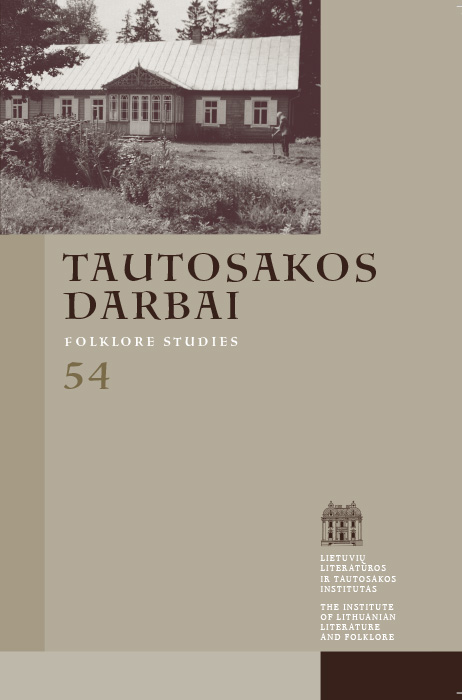Regarding Traditional Aspects of the Lithuanian Hemp: Interdisciplinary Analysis.
Abstract
The journal publishes an article by Rolandas Petkevičius (1976-2016) edited on the grounds of his manuscript legacy. Petkevičius was a researcher of Lithuanian ethnopsychiatry and ethnomedicine, a doctoral student at the Institute of Lithuanian Literature and Folklore working on a PhD thesis “Conception of Mental Health in the Traditional Lithuanian Culture”. He has also published several articles on the subject. Along with ethnomedicine, he was interested in ethnobotany, particularly in plants used in the traditional culture to cure mental disorders or / and to induce altered mental states, such as Datura stramonium L., Scopolia carniolica Jacq., Melilotus officinalis L., etc. This list also includes hemp (Cannabis sativa L.), cultivation and usage of which in Lithuania has so far escaped detailed scholarly attention. In this article, Petkevičius used archeological, linguistic and ethnographical data to elucidate possible origins of hemp in Lithuania. According to him, the wild hemp (Cannabis ruderalis) could have grown naturally on the Lithuanian territory some 5500 years ago, only subsequently becoming a cultivated plant. However, the author recognized the necessity of biological investigation of the Lithuanian hemp in order to provide a certain answer to this question. Such exhaustive investigation has not taken place so far, in spite of the first steps in that direction initiated by the experimental researchers at the Upytė station and enthusiasts of the cultivation of the Lithuanian hemp.
The second part of the article deals with usage of hemp in Lithuania. According to the historical and ethnographic data, hemp mostly served as material for making ropes, as food, as cure and as a natural repellent against garden pests.
The research results not only prove intense usage of hemp in the 20th century, but also indicate its important cultural function in the 21st century.
Downloads
Most read articles in this journal
- Oksana Kuzmenko, Russians in Ukrainian Folklore from the 20th and Early 21st Centuries: The Dynamics of the Images and Contexts , Tautosakos darbai: Vol. 64 (2022)
- Donata Mitaitė, Pranutė Aukštikalnytė-Jokimaitienė, One of the “Tragic Generation” , Tautosakos darbai: Vol. 65 (2023): Tautosakos darbai
- Jurgita Ūsaitytė, Song as a Propaganda Tool: Surveying the Soviet Time Songbooks , Tautosakos darbai: Vol. 65 (2023): Tautosakos darbai
- Aušra Kairaitytė-Užupė, Egidija Ramanauskaitė, The Emergence and Prevalence of Informal Youth Self-published Fanzines in Lithuania , Tautosakos darbai: Vol. 65 (2023): Tautosakos darbai
- Vita Ivanauskaitė - Šeibutienė, Dreams of Care and Consolation: Reflections of the Funeral Rites in the Dream Narratives , Tautosakos darbai: Vol. 63 (2022)
- Giedrė Raguotienė, Vilmantė Aleksienė, Jolita Zakarevičienė, Therapeutic Aspects of Traditional Music during Pregnancy, Childbirth and the Postpartum Period , Tautosakos darbai: Vol. 66 (2023): Tautosakos darbai
- Vytautas Budvytis, Jonas Basanavičius as Creator of the Thracian Theory of Lithuanian Origin , Tautosakos darbai: Vol. 62 (2021)
- Sandis Laime, Latvian Laumas: Reflections on the Witchisation of Tradition , Tautosakos darbai: Vol. 62 (2021)
- Saulius Pivoras, Lithuanian Proverbs as a Source of Natural Law Regulations in the Historical Writings of Simonas Daukantas , Tautosakos darbai: Vol. 66 (2023): Tautosakos darbai
- Skaidrė Urbonienė, “God-Maker” in Lithuanian Village of the End of the 19th – the First Half of the 20th Century: an Artist and / or a Craftsman , Tautosakos darbai: Vol. 53 (2017)




